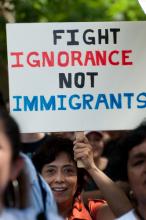otherization

They have many labels. Undocumented immigrants. Illegal Immigrants. Illegal Aliens. Wetbacks. Jan Brewer, the governor of Arizona, recently suggested that most of them are “drug mules.” Some have even called them “terrorists.” But few are known by their real names or treated as people with real lives.
Most of them live at the edges of the society, under inhumane and dangerous conditions, often separated from their loved ones. For some it may be a choice. However, a vast majority of the 11 million undocumented immigrants in the U.S. are driven to such extremes by factors beyond their control — political crisis, drug-related violence, famine, or eviction from their own homes at gunpoint. Theirs is a story of displacement, of being forced to flee their homes and take risks few would under normal circumstances. They are victims, not the offenders they are often made out to be. Still, for many, it is a story of being treated by the border security as violent criminals, being stripped of their clothes and dignity and separated from their families and traumatized in detention centers. It is also a story of ostracizing and exploitation by parts of the society. The labels and stereotypes about them “otherize” them in ways that prevent their full participation in the society. Injustices like these are the reason why NETWORK’s Nuns On The Bus have been touring across the country speaking out for immigration reform.